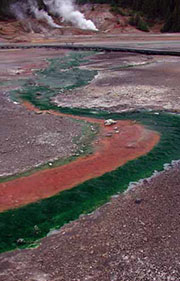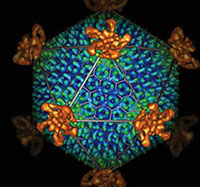About TBI

Established in 1999, the Thermal Biology Institute is a multidisciplinary team of
scientists forging a new path in scientific discovery focused on the unique thermal
environments within Yellowstone National Park. TBI is currently composed of fifteen
faculty representing expertise in biochemistry, geochemistry, microbiology, virology,
mycology, ecology, plant physiology, and environmental physics. In addition to an
emphasis on multidisciplinary research, TBI promotes interdisciplinary learning through
a strong educational component that incorporates undergraduate, graduate, and post-doctoral
training.
TBI faculty comprise an impressive list of renowned researchers who have collectively
garnered over $20 million in competitive research funding for MSU in the past 8 years,
including the recent NSF-funded $1.8 million remodel of TBI headquarters on the sixth
floor of Leon Johnson Hall. A brief list of influential and relevant research currently
conducted by TBI investigators and their students include the archaeal viral ecology
work of Mark Young, microbial mat community work of David Ward, the novel biofuels
and alternative energy work of Brent Peyton and Robin Gerlach, YNP geomicrobiology
work of Matthew Fields, unique work on mercury transformation in hot springs by Gill
Geesey, multi-site genome sequencing lead by William Inskeep and Tim McDermott, and
the computer simulation of hot springs microbial metabolisms by Ross Carlson.
TBI faculty represent some of the best researchers in biochemistry, geochemistry,
microbiology, virology, ecology, chemistry, biochemistry, earth science, engineering,
environmental science, and plant sciences. Our faculty members are extremely productive
and have utilized TBI research funds to leverage additional support from a variety
of competitive grant programs including NASA, National Institutes of Health, National
Science Foundation, Department of Energy, and the Department of Defense.

TBI faculty have numerous publications in top journals, including several influential papers in Science and the Proceedings of the National Academy of Sciences. The work of TBI investigators has been featured on the cover of the journals Science, the Proceedings of the National Academy of Sciences, and the Journal of Virology. TBI faculty have been recipients of national awards and invited speakers at numerous local, national and international meetings, and have been featured in local and national newspaper articles, television documentaries, and national magazines.
The long-term goal of TBI is to understand how organisms respond and adapt to the unique physical and chemical features of geothermal environments. We are committed to furthering scientific understandings of the extreme limits of life on our planet, and working to ensure a sustainable future for research and outreach focused on the geothermal features of Yellowstone National Park.
Learn more about us

Matters Microbial #59: Some (Microbes) Like It Hot—Discussions with the Thermal Biology Institute
Hear from Brent Peyton, Dana Skorupa, Zackary Jay, Anthony Kohtzy discuss the TBI alongside host Mark O. Martin in the MicrobeTV podcast Matters Microbial on Youbtube
